
Huwen op Bevel is a 1931 romance film from the Dutch East Indies. Directed by G. Krugers and thought to have been produced by Tan's Film, it follows two young lovers who are nearly separated but can ultimately be together. A critical flop, it was Krugers's last as a director. It is likely lost.
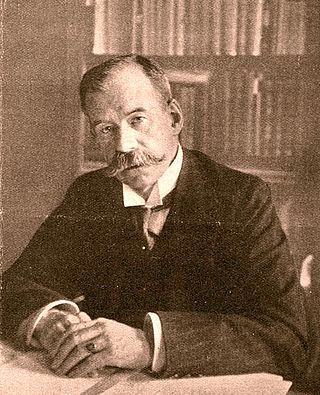
Conrad Theodor "Coen" van Deventer was a Dutch lawyer, an author about the Dutch East Indies and a member of parliament of the Netherlands. He became known as the spokesman of the Dutch Ethical Policy Movement. He lived at Surinamestraat 20, The Hague (1903–1915), former residence of John Ricus Couperus, his son writer Louis Couperus and the rest of his family (1884–1902).

Ajah Berdosa is a likely-lost 1941 film from the Dutch East Indies directed by Wu Tsun for Star Film. Starring M. Arief, S Waldy, Elly Joenara, and Soetijem, it follows a villager named Mardiman over a period of several years, in which he loses everything owing to his infatuation with a "modern" woman.
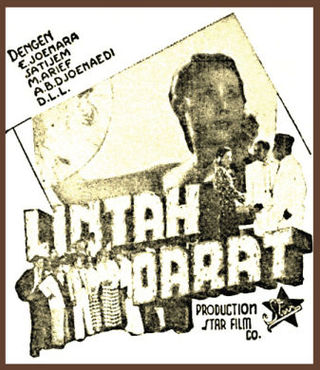
Lintah Darat is a 1941 film from the Dutch East Indies directed by Wu Tsun and produced by Jo Eng Sek.
De Indische Courant was the name of a number of Dutch language newspapers published on the island of Java in the Dutch East Indies.
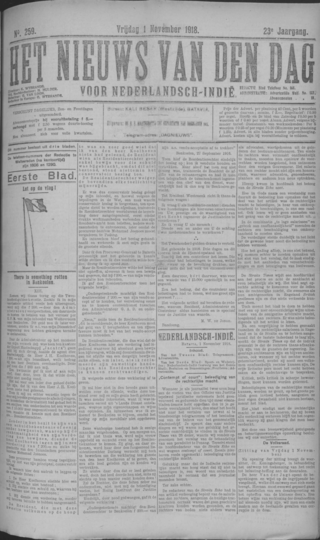
Het Nieuws van den Dag voor Nederlandsch-Indië was a Dutch-language newspaper published on the island of Java in the Dutch East Indies. Originally called De Indische Courant, it was published in Batavia from 1895 or 1896 to 1900 until it was renamed. One of the paper's contributors was Dutch author and critic of the colonial system Multatuli.
Singa Laoet is a 1941 film from the Dutch East Indies. Directed by Tan Tjoei Hock and produced by The Teng Chun, it starred Tan Tjen Bok, Mohamad Mochtar, and Hadidjah.

Star Film was a film production company in the Dutch East Indies. Established by Chinese-Indonesian businessman Jo Eng Sek and Chinese cameraman Cho' Chin Hsin in 1940, it produced five black-and-white films in 1940 and 1941; two of these were directed by Jo, and the remainder were directed by Wu Tsun. Another film was under production when the studio was closed following the Japanese occupation of the Dutch East Indies. Star helped establish the careers of actors such as S Waldy and Elly Joenara, and produced screenplays written by Rd Ariffien and Saeroen; its output, however, is probably lost.
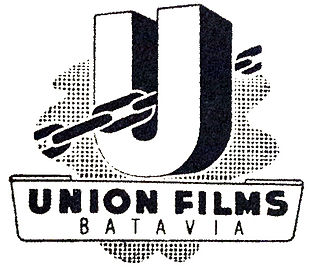
Union Films was a film production company located in Batavia, Dutch East Indies. Established by ethnic Chinese businessmen Ang Hock Liem and Tjoa Ma Tjoen in 1940, it produced seven black-and-white films before it was dissolved in 1942; all are thought to be lost. The company's films were directed by four men, mostly ethnic Chinese, and launched the careers of actors such as Rendra Karno and Djoewariah.

Soeara Berbisa is a 1941 film from the Dutch East Indies. Produced by Ang Hock Liem for Union Films and directed by R Hu, this black-and-white film stars Raden Soekarno, Ratna Djoewita, Oedjang, and Soehaena. The story, written by Djojopranoto, follows two young men who compete for the affections of a woman before learning that they are long-lost brothers.

Jacobus Smede "Koos" Sinninghe Damsté (1902–1995) was a lawyer in colonial Indonesia during 1927–1942, prosecutor of Japanese war criminals during 1946–1947, chairman of the national business association in Indonesia during 1948–1954, and head of the Netherlands Security Service during 1955–1967.

Tjhoen Tjhioe was a Malay language Peranakan Chinese newspaper from Surabaya, Dutch East Indies catering mainly to the Chinese population. The full title of the paper was Tjhoen Tjhioe: Soerat kabar dagang bahasa Melajoe jang moeat roepa kabar penting bagi bangsa Tionghoa. Although the paper only existed for a short time, during that time it was recognized as one of the top Chinese newspapers in the Indies, alongside Sin Po and Perniagaan.
Parada Harahap was an important journalist and writer from the late colonial period and early independence era in Indonesia. In the 1930s, he was called the "king of the Java press". He pioneered a new kind of politically neutral Malay language newspaper in the 1930s which would cater to the rising middle class of the Indies.

Algemeen handelsblad voor Nederlandsch-Indië was a Dutch language newspaper which was published in Semarang, Dutch East Indies from 1924 to 1942.
Evert Jansen was a newspaper editor, journalist and politician from the Dutch East Indies. From the 1910s to the 1940s, he was editor of a number of major papers including De Locomotief, Bataviaasch Nieuwsblad, Algemeen handelsblad voor Nederlandsch-Indië, and De Indische Courant.
Keng Po was a Malay language Peranakan Chinese newspaper published in Batavia, Dutch East Indies from 1923 to 1958. During most of that time it was the second-most popular Malay-language Chinese newspaper in the Indies after Sin Po. It was also an important paper in the early period of Indonesian independence in the 1950s.
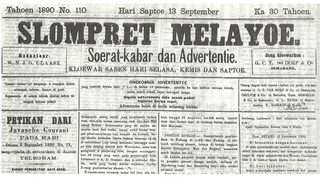
Selompret Melajoe was one of the first Malay language newspapers to publish in the Dutch East Indies. It was printed in Semarang, Central Java from 1860 to 1920.

Louis Johan Alexander Schoonheyt (1903-1986), commonly known as L. J. A. Schoonheyt, was a Dutch medical doctor, writer, and supporter of the National Socialist Movement in the Netherlands before World War II. From 1935 to 1936 he was the camp doctor at the Boven-Digoel concentration camp in New Guinea, Dutch East Indies, and is mostly known today for the book he wrote about his experiences there, Boven-Digoel: Het land van communisten en kannibalen (1936). His praise for the conditions in the camp earned him the ire of the internees, Indonesian nationalists, and Dutch human rights advocates; E. du Perron called him a 'colonial bandit', while many internees burned his book after reading it in the camp.

Sinar Sumatra was a Malay-language newspaper published in Padang, Dutch East Indies from 1905 to around 1941 or 1942. It is generally considered a Peranakan Chinese publication, although it had European publishers and Minangkabau editors as well. During the pre-World War II period it was one of the most widely-read Malay language newspapers in Sumatra.

HNLMS Rigel was a multi-purpose steamship of the Government Navy that could also be used as minelayer and as yacht for the Governor-general of the Dutch East Indies. The ship was militarized in 1939 and taken into service of the Royal Netherlands Navy, where it served as minelayer between 1939 and 1942.















